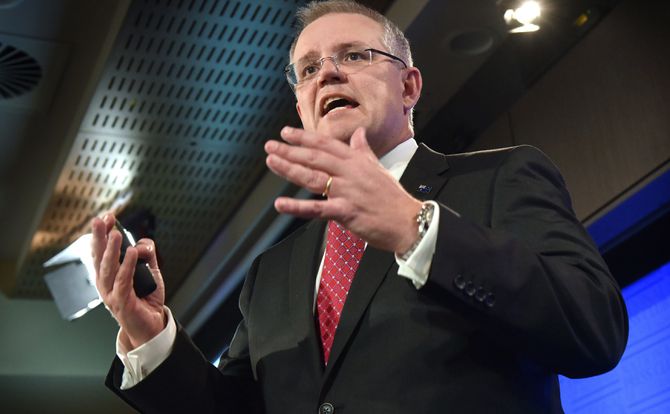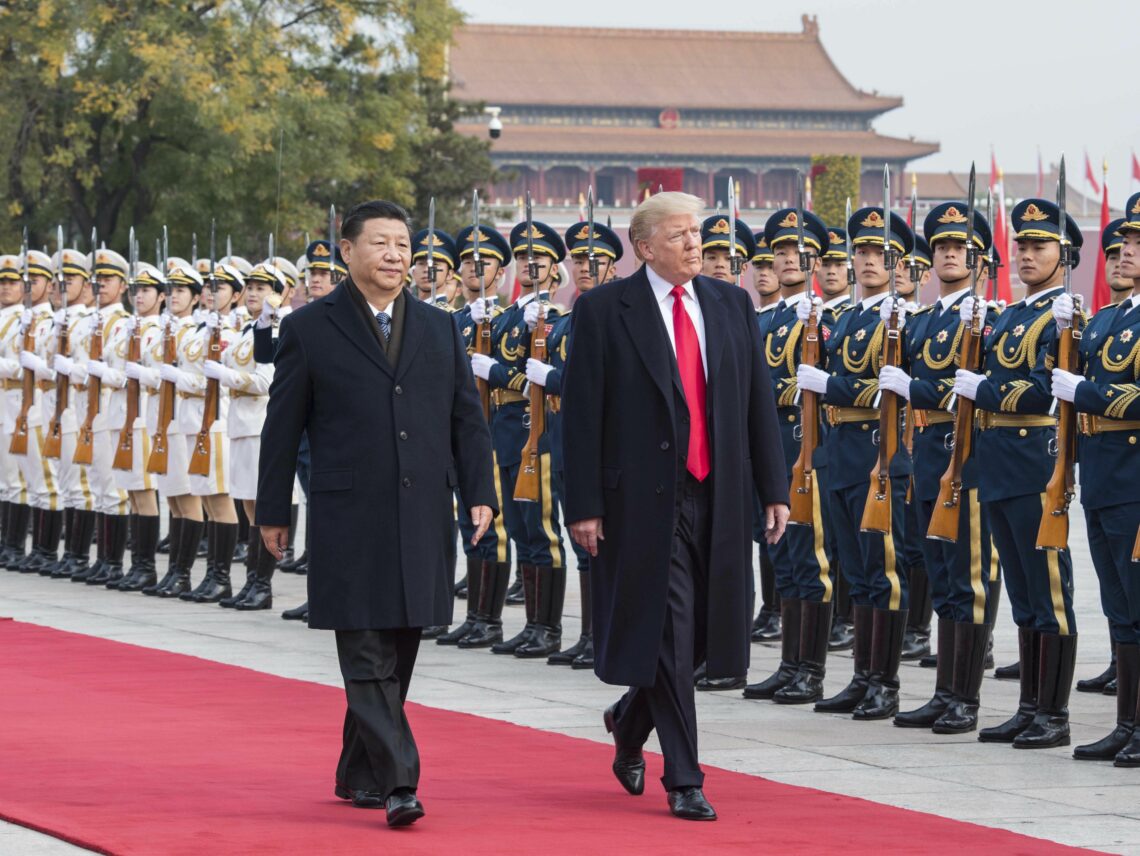Australia navigates Sino-American tensions
After elections in May, the new government of Australia must decide how to balance its foreign policy. The economic relationship with China is paramount, but Australia also has interests in the security of its immediate neighborhood and shares a great deal with the U.S.

In a nutshell
- Rising US-China tensions are being felt in Canberra
- Voices in Australia are calling for more independence
- Washington’s posture on China will shape Australia’s path
Australia’s May 18 federal elections came at an interesting time in the development of the country’s foreign policy. Crosscurrents between Canberra’s long-held faith in its alliance with the United States and its growing economic relationship with China roiled beneath the surface.
Australia’s interests are in the security of its immediate neighborhood, its commitment to a rules-based order and its economic ties with China. How Prime Minister Scott Morrison’s new Liberal-National government pursues these interests, however, will be conditioned by decisions outside his control: U.S. leadership in the Indo-Pacific; America’s relationship with China; and developments in China’s orientation.
Chinese interference
Although China was not central to either campaign – like elections in most countries, the focus in Australia was on domestic policies – it did figure prominently in the background.
The past several years have been difficult for relations between the two countries. Australia has become a prime exhibit in a global narrative of Chinese interference in the politics of democratic nations. Anecdotes of run-ins with Chinese authorities or proxies are common in Australian political circles. They range from stories about book publishers turning down manuscripts that might offend Beijing to professors self-censoring for fear of being reported by regime-connected students.
The problems have also gone a good bit deeper. In 2016, reports broke that the billionaire Huang Xiangmo, a Chinese-born permanent resident with links to the Chinese Communist Party (CCP), had made major financial contributions to Australian politicians, parties and politically influential organizations. One recipient, Senator Sam Dastyari, was forced to resign when connections were revealed between the largesse he received from Mr. Xiangmo and remarks he made in favor of Beijing’s official position on the South China Sea.
Deep freeze
Responding to these events and more comprehensive government intelligence assessments, Canberra enacted new legislation tightening its counterespionage laws, banning foreign political donations and requiring those who work on behalf of foreign interests to register as foreign agents. The rush of legislative activity was clearly about China, and Beijing was not happy about it. The new measures compounded Chinese displeasure over complaints about other Australian security-based policy decisions, starting with the ban on Chinese national champion Huawei from the build-out of Australia’s 5G network.
Canberra cannot afford to sign up for such a systematic showdown with China.
As a consequence, Beijing imposed a yearlong (2017-2018) freeze on relations with Australia, including denial of visas to Australian officials, exclusion from international events like the annual Boao Economic Forum, and delaying educational exchanges. Visits to China by Australia’s foreign and trade ministers late last year appeared to signal the end of the “freeze.” Yet since February of this year, Australian coal shipments – a leading export to China – have experienced unusual processing problems at Chinese ports. This could be a signal from Beijing that despite the lifting of the diplomatic freeze, it is not ready to let Canberra off the hook for its policy decisions.
With the election now over, Prime Minister Morrison is in a difficult situation. His government is at the center of a debate over balancing relationships with its leading trading partner, China, and its security ally, the U.S.
Australia’s trade-offs
Just as Europe has its well-known China-boosters, such as former Prime Ministers Jean-Pierre Raffarin in Paris and David Cameron in London, Australia has former Prime Minister Paul Keating and former Minister for Foreign Affairs Bob Carr. Along with the business community and a handful of visible public intellectuals, most notably former Deputy Defense Secretary Hugh White, these figures present the Australian public with a vision of foreign policy that is less dependent on the U.S.
It is too stark to say that Australia faces a choice between China and the U.S. First of all, China may be Australia’s number one export market, but American investment in Australia dwarfs Chinese investment (27 percent of the annual foreign direct investment total versus 2 percent) and faces far less scrutiny by authorities. The U.S. is also by far the leading destination of Australian foreign investment.
It is not simply a matter of security versus economy. The real choice is between a generally pro-U.S. strategy that continues to manage tensions between these two relationships, and an independent posture that strains relations with the U.S. as the price of optimizing economic relations with China.

Which way Australia goes depends on how much room Washington gives it. Theoretically, an American strategy that seeks contention across the range of diplomatic and security areas may help China develop respect for American interests and lead to a more stable bilateral relationship. It will, however, put Australia in a very difficult spot; the U.S. will expect Australian support, whether on freedom of navigation in the South China Sea or deterring Chinese aggression toward Taiwan. In turn, China will react negatively to these Australian positions, accusing it, as it often has, of blindly following its Cold War ally.
That said, Australia can hold this line – or as Mr. Morrison put it during the election, it can “stand by its friends and its customers as well.” Australia shares strong positions with the U.S. across a spectrum of issues, including human rights and other tricky diplomatic areas. The U.S. and Australia have a remarkably close security relationship, involving Australian military officers in the U.S. chain of command, joint training and exercises, shared facilities, deployments of the U.S. Marines and Air Force in Australia, and shared combat experience from Iraq and Afghanistan to the southern Philippines. The security alliance is as deep and broad as any in the world. It can withstand Chinese displeasure with Australia on specific political and security issues.
Conflict-averse
Some factors, however, could trigger the second, independent scenario. The most potent is the characterization of U.S.-China competition as a new Cold War. The Australians can coordinate diplomatic representations with the U.S. and continue to build military-to-military contacts. They can even find common cause with the U.S. on issues like 5G security and China’s Belt and Road Initiative. Each of these responses has a very compelling rationale, but becomes much more difficult to pursue when portrayed in the context of a new Cold War.
More U.S. pressure on China would push Canberra toward an independent approach.
This is more than just a matter of rhetoric. An endless American trade war with China will bring home in very concrete ways that U.S. policies, and therefore Australia’s acquiescence in them, have helped to bring on a larger geostrategic confrontation. Canberra cannot afford to sign up for such a systematic showdown with China.
Here the Australian China-boosters have a point. The lesson of the “freeze” is that China is willing to get tough on the things that matter most, especially the fate of national champions like Huawei and ZTE. If measures like the 5G ban are truly about Australian security, Canberra can politically sustain China’s pushback. But faced with a choice between a grand U.S.-led geopolitical showdown and its own economic interests, Australia will naturally gravitate toward the latter.
Unresolved argument
Finally, one cannot account for future scenarios without looking at China’s own behavior. The Trump administration’s assertiveness cannot be solely attributed to his well-known idiosyncrasies. The direct tone on China shown in several documents – including the White House’s 2017 National Security Strategy, the 2018 National Defense Strategy, and the Pentagon’s 2019 Indo-Pacific Strategy Report – responds to pent-up demand in Washington for a more forceful approach.
On trade, President Trump is pursuing his long-held protectionist views. Even so, the real issues at the heart of the conflict with China, including intellectual property rights and cyber espionage, are American complaints that predate his administration by many years.
Continued bad Chinese behavior will help sustain the hardening of the U.S. position and justify its policy in the eyes of Canberra. It will make it easier for Australia to heed American warnings on China, even if they smack of a global power struggle.
By the same token, improved Chinese behavior will undercut the most sweeping anti-China arguments coming out of Washington. If the Trump administration’s intention is to pursue a great power rivalry without regard to specific policy outcomes, it will be exposed by Chinese steps to remove the source of the stated complaints. In the face of continued U.S. pressure on China, this would make Canberra more inclined to take an independent approach.
A lively debate is raging in Australia over its regional orientation. The recent federal elections did not settle the argument, which will continue to buffet the next government. How Washington and, to a lesser extent, Beijing decide to act over the course of Prime Minister Morrison’s tenure will largely shape the Australian response.








